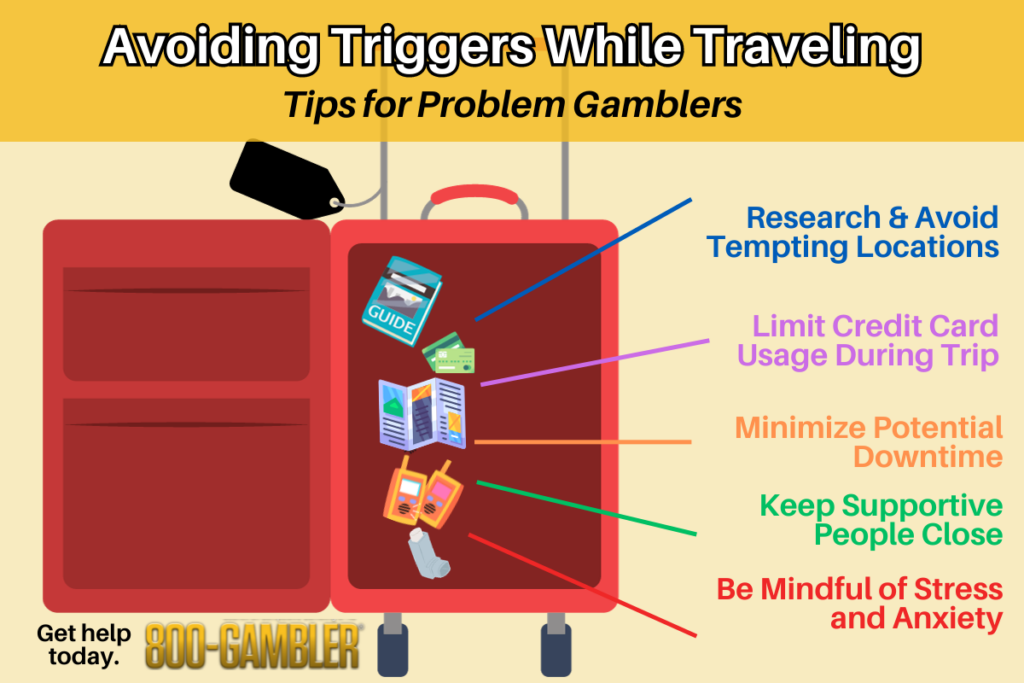Traveling can be a liberating experience. It broadens our horizons, exposes us to new cultures, and provides a welcome break from our daily routines. However, for those who have had issues with problem gambling, the excitement of travel can sometimes lead to unexpected challenges. One key strategy in managing these challenges is learning how to identify triggers that may lead to problem gambling behaviors.
Triggers can be anything that reminds you of gambling or creates a desire to gamble. These can vary greatly from one person to another. For some, it could be seeing a casino or a lottery ticket, while for others, it might be as simple as having a certain amount of money in their pocket. Recognizing these triggers is crucial in preventing relapse and maintaining control over your actions. Let’s explore a few common triggers you may encounter while traveling and discuss strategies to handle them!

Trigger #1: Gambling Opportunities
One of the most obvious triggers for problem gamblers while traveling is the presence of casinos and other gambling venues. Some hotels and resorts feature on-site casinos or offer nearby access to gambling facilities. Certain tourist attractions, such as lottery booths or interactive games, may also incorporate less “professional” gambling elements. Problem gamblers may find it challenging to resist the urge to participate in these activities, even in seemingly innocent forms.
The best way to avoid this type of trigger is to do some research before you depart. Prior to embarking on your trip, check out what’s close to your destination(s). Identify areas with a high concentration of casinos or gambling attractions and strategically plan out your itinerary to avoid these zones. It may also be worthwhile to choose different accommodations if the location you had in mind.
Trigger #2: Credit Cards
Credit cards are convenient while traveling, providing easy access to funds across international borders. However, this can also make them an all-too-easy pathway towards problem gambling.
To manage this while traveling, you must rethink your relationship with credit cards. Instead of viewing them as a source of unlimited funds, consider them a tool for emergencies or planned expenses only. Set strict spending limits for your trip and track your expenditures regularly to stay within the allocated limits. You can also take advantage of technology to protect yourself. Some financial institutions offer features that allow users to block transactions related to gambling or prohibit withdrawals exceeding a specific amount of money. Activating such blockers on your credit cards adds an extra layer of protection and reduces the temptation to use them for gambling activities.
Trigger #3: Extra Downtime
Traveling often involves a lot of downtime, which can lead to temptations. It can be all too easy to get sucked into playing slots or day trading on your phone at the airport, quickly ducking into a local convenience store to buy a lottery ticket, or using a fun night out as an excuse to gamble.
An effective way to counter this is by finding alternative activities to occupy your time. Explore local attractions like museums, art galleries, and historical sites. Try new cuisines or enjoy a (responsible) wine or beer tasting. If you have the budget to do so, also consider signing up for plenty of guided tours and/or scheduled events. The aim is to fill your time with enjoyable and fulfilling experiences, leaving little room for gambling temptations. This approach not only helps manage triggers but also makes your trip even more amazing!
Trigger #4: Peer Influence
Traveling often involves social interactions and group activities. Peer pressure from family or friends who engage in gambling can serve as a trigger for individuals with gambling problems. The desire to fit in or share the experience with others may lead to impulsive decisions.
To avoid this possibility during your trip, consider traveling with a supportive companion who is aware of your commitment to problem gambling recovery. Having someone who understands your goals can provide emotional support and act as a deterrent in situations where the temptation to gamble arises. Even if you do not choose to share every detail of your situation, something as simple as informing your friends and family that you would like to avoid gambling can be a helpful way to address this issue before it comes up on the trip. Finally, don’t forget to bring contact information for your therapist, support group, or treatment center so you can get in touch with them if needed.
Trigger #5: Stress & Anxiety
Even though traveling is supposed to be fun, things don’t always go exactly as planned. Delayed flights, lost baggage, navigation mistakes, bad weather, miscommunication with travel companions — the list goes on and on when it comes to factors that can disrupt your trip and cause increased stress and anxiety. Some people develop gambling problems as a response to these negative emotions, so if you fall into this category, experiencing a high level of discomfort may make you tempted to engage in problem gambling.
Regular self-reflection can help you identify warning signs of stress and implement strategies to cope without resorting to gambling. Remember to practice mindfulness techniques to stay attuned to your emotions and impulses. Spending time on techniques like deep breathing, meditation, and journaling can also help you maintain emotional balance in both short and long-term capacities. If you are working with a therapist or support group for problem gambling recovery, also make sure to make time to talk about your feelings and how potential triggers might impact your experience prior to the trip.
Your Journey Towards Mindful Traveling
Traveling as a problem gambler doesn’t have to be a daunting prospect. By learning to identify triggers and handle them responsibly, you can enjoy the wonders of travel without falling into old habits. Remember, the goal is not just to stop gambling irresponsibly but to create a meaningful life where gambling no longer holds appeal. With mindfulness, dedication, and the right support, you can embrace the joy of traveling in a healthier and happier way.
If you are struggling with problem gambling, 800-GAMBLER is just a call away. Our toll-free, confidential helpline is open 24/7, and we are ready to connect you to the resources you need to get the help you deserve, including support groups, treatment programs, and much more. Reach out to us today!



